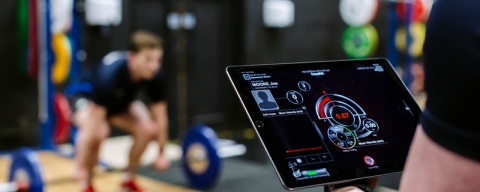
Key information
UCAS code:
C600
Accreditation:
This course is Accredited
Typical offer:
112-120 UCAS points to include a minimum of 2 A levels, or equivalent, with 32 UCAS points from a specific Science subject
Showing content for section Overview
Overview
Pushing boundaries. Breaking records. Competing in extreme environments.
On this BSc (Hons) Sport and Exercise Science degree, you’ll learn to apply scientific principles that help athletes perform at their best.
But it's not just elite sportspeople who will benefit from your knowledge and skills. Become a passionate advocate for the essential role sports science plays in society as you uncover ways everyone can use physical activity to boost their health and wellbeing.
Explore BSc (Hons) Sport and Exercise Science at Portsmouth
Find out more about our BSc (Hons) Sport and Exercise Science degree course, including what you'll study, the facilities you'll access, and the career opportunities it offers.
Joseph Moore: Sport and exercise science is a combination of biomechanics, physiology and psychology. The course here at the University of Portsmouth is accredited by Bases, which is the British Association of Sport and Exercises and Bases are the governing body for sport and exercise science.
Here at the University of Portsmouth, we have a number of different laboratory spaces that are used both for teaching but also all of the research that goes on within the university. We also have lots of equipment that can analyse how much we are breathing. We have motion capture systems, force plates and also sensors that allow us to measure the amount of muscle activity that's going on.
One of our areas within the university is what's called our Extreme Environments Laboratory to allow us to simulate a variety of different temperatures and different environments to see how the body adapts.
The key thing for us is the employable skills that you gain throughout your degree. Yes, set yourself up for a sport and exercise science career, but it also gives you a really good base of transferable skills that allow you to be successful in any workplace.
In terms of the placements we have two opportunities through placements and that can be that done between your second and third years or actually by postponing your graduation and doing after your third year.
Careers after sport and exercise science are really, really broad, such strength and conditioning coaches, personal trainers, clinical physiology roles, physiotherapy. But we also have a number of students who go to work within football clubs, within rugby clubs as sports scientists. So one thing I say to any student considering coming to the University of Portsmouth is we can really promise you that you are going to be taught by enthusiastic experts in sport and exercise science. Yes, your degree might be three or four years depending if you do a placement, but that's not where the journey ends. And we're going to be really focussed on ensuring that your time at university is going to set yourself up to get that dream job and be a success in your future career.
Course highlights
- Put your learning into practice in our advanced sports science facilities including three climatic chambers, a swimming flume and motion capture systems
- Be taught by expert staff who are actively engaged in research projects that inform the future of sport and exercise science
- Enhance your CV as you gain valuable experience through our ties with local sports and healthcare providers
- Set yourself up for a career in professional sport, healthcare or education

5th
for Anatomy and Physiology in the UK
(Guardian University Guide, 2024)
Endorsed by:
This course is endorsed by the British Association of Sport and Exercise Sciences (BASES).
Contact information
Contact AdmissionsEntry requirements
BSc (Hons) Sport and Exercise Science
Typical offers
- A levels - BBB-BBC
- UCAS points - 112-120 points to include a minimum of 2 A levels, or equivalent, with 32 points from a Science subject (Biology, Chemistry, Mathematics, PE, Physics, Psychology or Sports Science and the Active Leisure Industry or Sports Studies). (calculate your UCAS points)
- T-levels - Merit. Acceptable T Level Subjects:
T Level in Health, T Level in Healthcare Science, T Level in Science - BTECs (Extended Diplomas) - DDM-DMM
- International Baccalaureate - 25
You may need to have studied specific subjects –find full entry requirements and other qualifications we accept.
English language requirements
- English language proficiency at a minimum of IELTS band 6.0 with no component score below 5.5.
See alternative English language qualifications.
We also accept other standard English tests and qualifications, as long as they meet the minimum requirements of your course.
If you don't meet the English language requirements yet, you can achieve the level you need by successfully completing a pre-sessional English programme before you start your course.
If you don't meet the entry requirements, you may be able to join this course after you successfully complete a foundation year.
We look at more than just your grades
While we consider your grades when making an offer, we also carefully look at your circumstances and other factors to assess your potential. These include whether you live and work in the region and your personal and family circumstances which we assess using established data.
Facilities and specialist equipment
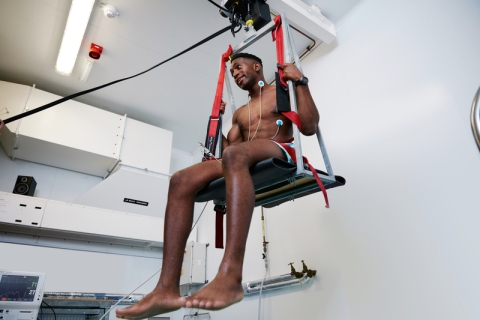
Extreme environments laboratories
See how altitude and humidity affect people's comfort, performance and survival. Features an immersion pool and swimming flume, which acts like a treadmill for swimmers.
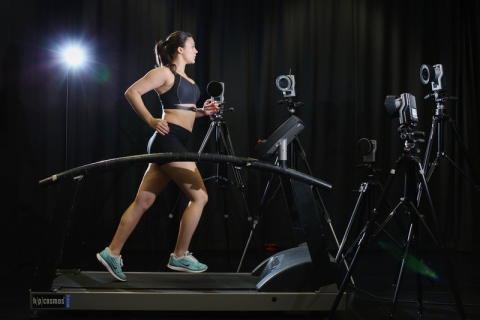
Biomechanics laboratory
Use equipment including force plates, pressure plates and our electromyography system to explore the impact of exercise on the body in this lab, from the limits of human endurance to the effects of chronic health conditions.
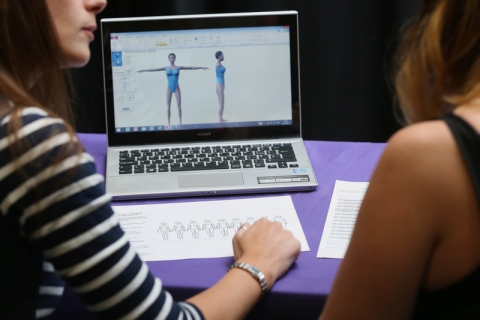
Dr Alex Milligan Research Laboratory
A flexible work space featuring a Polhemus motion tracking system for tracking athletes' movement in 3D and a DEXA scanner for measuring body fat.
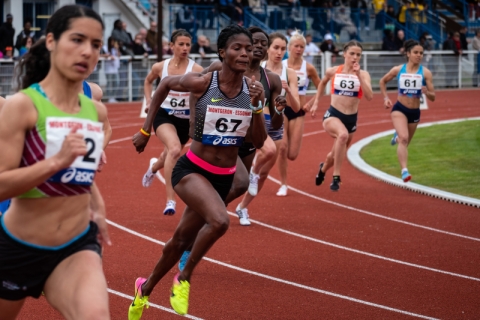
Sports and human performance testing
Analyse sports performance and environmental physiology, and use some of the best extreme environments facilities in the UK.
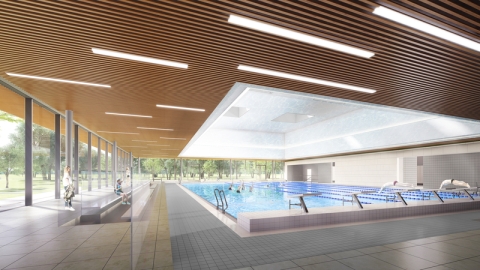
Our £50m sports centre
Train and play in one of the UK's greenest sports centres, including an 8-lane swimming pool, virtual skiing, climbing wall and more.
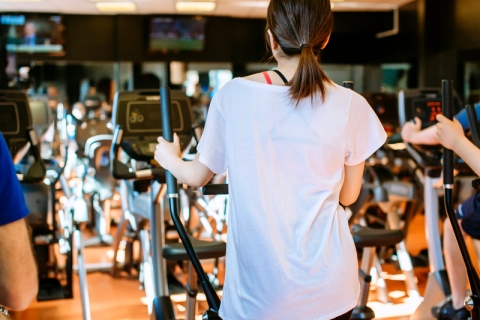
Gym and classes
Ravelin Sports Centre has all you need for cardio, resistance and weight training, complete with air-conditioning and BT Sport. Membership includes a range of fitness classes too.
Research in the School of Sport, Health and Exercise Science
Learn more about the groundbreaking research in several key areas and themes being carried out at the School of Sport, Health and Exercise Science.
Dr Joe Costello:
Our research spans the broader area of sport, health and exercise. We have three research themes. The first is Extreme Environments focuses on the selection, preparation and protection of those who enter extreme environments. The second is physical activity, health and rehabilitation. So we focus on clinical and also non-clinical conditions and also how physical activity can help improve the lives of people. Our third and final theme, Individual, occupational and organisational performance looks to see how we can improve the performance of individuals, organisations and teams.
The facilities that I use at the university is our biomechanics lab. The types of equipment that we use is a 3D-camera system. Which allows us to put markers on an individual and track their movement in 3D so we can really look at their movement in detail. We also use force platforms to have a look at the ground reaction forces and also EMG as well, which is Electromyography, which allows us to look at muscle activity and we can track that through different rehabilitation processes.
So the outcomes that I've seen from my research has been improvements in walking speed, for example, which we know is one of the high outcomes of quality of life for individuals who live with stroke. In sort of the preliminary research that we've had a look at, it's looking positive in terms of using different robotic rehabilitations to improve functional outcomes of individuals with stroke.
I'm based with the Extreme Environments Group and they've built a reputation over many years of looking at the physiological responses to all of our different extreme environments. So our heat, our cold and our hypoxia, we can effectively recreate any environment that you would come across on Earth. So we've got a heat chamber that can go up to around about 50 degrees. We've got a cold chamber that can go down to about -20. And then we also have another environmental chamber that contains a flume. And then, all three of those chambers can create a hypoxic environment or simulate altitude so we can go anywhere from sea level to around about 8000 metres. So, we could effectively put someone in a rainforest, in a desert, up the top of Mount Everest.
The facilities and expertise that we have in Portsmouth are among the best in the world. With the heating, we can increase the temperature in the flume and use the mechanism to move people into the flume and control how hot they get by adjusting their position. We have a plunge pool as well in one of the other environmental chambers, and then also we can simply just use normal hot tubs.
In terms of career opportunities, the great thing about the extreme environments work in particular is that often exposure to these extreme environments often mimics clinical conditions. So as well as continuing to be able to offer guidance and work in the areas specific to extreme environments, it also opens up a really nice avenue for you to then go in to work in hospitals, in more clinical populations.
I'm really proud of the research that I do. There's been some particular individuals who wouldn't leave their house at all, even if a member of their family went with them. And now, at the end of their intervention, are happy to walk to the corner shop, even on their own and that has a massive impact on their quality of life, and that's really amazing.
Some of the research that's come out of this school has heavily informed the 'RNLI: Respect the Water Campaign' over the last couple of years, and that's something that makes me passionate to continue working at the University of Portsmouth.
The lab classes enhance what you have already learnt during lectures.
Careers and opportunities
In today's health-conscious world, the sports and health industries continue to expand. Sport and exercise scientists have a vital role in keeping sportspeople, athletes and the general population in peak physical health.
Sport and Exercise Science Graduate Sam Millard
Meet Sam Millard, an assistant strength and conditioning coach, and a graduate of the University of Portsmouth's Sport and Exercise Science degree.
Sport and Exercise Science is a combination of biomechanics, physiology and psychology.
The course here at the University of Portsmouth is accredited by BASES, which is the British Association of Sport and Exercises Sciences and BASES are the governing body for Sport and Exercise Science.
Here at the University of Portsmouth we have a number of different laboratory spaces that are used both for teaching but also a lot of the research that goes on within the university.
We also have lots of equipment that can analyse how much we are breathing.
We have motion capture systems, force plates and also sensors that allow us to measure the amount of muscle activity that's going on.
One of our areas within the university is what's called our Extreme Environments Laboratory that allows us to simulate a variety of different temperatures and different environments to see how the body adapts.
The key thing for us is the employable skills that you gain throughout your degree.
Yes, set yourself up for a sport and exercise science career, but also give you a really good base of transferable skills which will allow you to be successful in any workplace.
In terms of the placements, we have two opportunities to do placements and that can be either done between your second and third years or actually by postponing your graduation and doing after your third year.
Careers after Sport and Exercise Science are really, really broad such as strength and conditioning coaches, personal trainers, clinical physiology roles, physiotherapy, but we also have a number of students who go to work within football clubs, within rugby clubs, as a sport scientists.
So one thing I say to any student who’s considering coming to the University of Portsmouth is, we can really promise you that you are going to be taught by enthusiastic experts in sport and exercise science.
Yes, your degree might be three or four years depending if you do a placement, but that's not where the journey ends and we're going to be really focused on ensuring that your time at university is going to set yourself up to get that dream job and be a success in your future career.
What jobs can you do with a sport and exercise degree?
Roles our graduates have gone onto include:
- PE teacher
- personal trainer
- clinical physiologist
- NVQ coordinator
- sports development officer
- sports and exercise scientist
- sports therapist and physiotherapist
- cardiac rehabilitation technician
Graduate destinations
Organisations our graduates have gone on to work in, include:
- Crystal Palace Football Club
- Portsmouth Tennis Academy
- Bupa
- Nuffield Health
Ongoing careers support
After you graduate, you can get help, advice and support for up to 5 years from our Careers and Employability Service as you advance in your career.
Placement year (optional)
Either before or following your third year, you have the option to choose a work placement year to gain valuable longer-term work experience in the industry.
Our specialist team of Science and Health Careers advisors can help you with finding a work placement and improving your employability skills. They'll provide you with a database of placement vacancies, support with your job search – including help with applications and interviews – and support throughout your placement year.
Potential placement roles
Previous students have taken on placement roles including:
- sport for development project officer
- performance analyst
- assistant sports therapist
- women's sport engagement officer
- physical technician
- academy coach
- PE teacher
- physiotherapist assistant
- rugby development coach
- nutritionist
Potential placement destinations
Previous students have completed placements in the following organisations:
- Reading FC
- Pompey in the Community
- Exeter City FC
- Sussex County Cricket Club
- Welsh Rugby Union (WRU)
Jamie's placement - Portsmouth Football Club
Jamie Todd, a BSc (Hons) Sport and Exercise Science student, talks about his placement working on performance analysis at Portsmouth Football Club.
Jamie Todd: Since I started university, I knew this is what I wanted to do.
Richard Hughes: The students that we're lucky enough to have here provide a real big element of the work we do. They're gaining a great experience from their personal perspective as well, but also they provide an invaluable service to us in functioning the football club on a day to day basis and getting an understanding of what an elite football club looks like and what that environment is, is really important.
Jamie Todd: I currently studying Sport and Exercise Science at the University of Portsmouth and I've come on placement here with the football club to work with the sports science department to basically help them out in terms of the GPS analysis, recovery and injury prevention. We give the players, the GPS vests, which allow us to look at total distance, accelerations and decelerations, high sprint distance and maximum velocity. So I already had in my mind I wanted to go into a football club and do a placement. Looking for that link between the university and football club was massive for me to be able to get the opportunity to come on placement and gain valuable experience that I needed.
Richard Hughes: With my background, I came through an internship program at Stoke City and I was lucky enough to be part of the analysis support. And I always like to try and give people opportunities and getting people that are really hungry to be successful.
Jamie Todd: The advice I'd give someone who's looking to do a placement for Portsmouth Football Club would be just go and do it. To be one of the students who got offered it, I feel very proud and I have got to keep going now.
Study abroad
You'll also have the opportunity to study abroad at one of our partner universities. Studying overseas is a fantastic opportunity to enhance your CV and experience a different culture as an international student.
Many of our students describe their time spent studying abroad as truly life-changing, as well as an excellent way to stand out to future employers.
Modules
Each module on this course is worth a certain number of credits.
In each year, you need to study modules worth a total of 120 credits.
Modules
Core modules
Core modules
Optional modules
Core modules
Optional modules
Optional modules
When you complete this module successfully, you'll be able to:
-
Identify and demonstrate skills developed through overseas study (e.g. personal autonomy and accountability, language and/or interpersonal communication, time management and planning, assessment and analytical skills – while evaluating the impact of your actions).
-
Manage and complete tasks in an overseas study environment relevant to your course, with an appropriate level of skill, initiative, independence and performance.
-
Identify and reflect on the learning experience and the relevance of this learning to future employability and personal development, identifying areas for improvement or further training.
-
Evaluate how the study placement activities relate to knowledge and practice covered on your course, and/or broader global or international perspectives.
-
Orally present and discuss a critical evaluation of the professional development process.
When you complete this module successfully, you'll be able to:
-
Identify and demonstrate skills developed in the work place (e.g. professional autonomy and accountability, interpersonal communication, time management and planning, assessment and analytical skills – while evaluating the impact of your actions).
-
Manage and complete tasks in a business/work environment relevant to your course, with an appropriate level of skill, initiative, independence and performance.
-
Identify and reflect on the learning experience and the relevance of this learning to future employability and personal development, identifying areas for improvement or further training.
-
Evaluate how work placement activities relate to knowledge and practice covered on your course, and/or broader perspectives on the world of work.
-
Present and discuss a critical evaluation of the professional development process.
Changes to course content
We use the best and most current research and professional practice alongside feedback from our students to make sure course content is relevant to your future career or further studies.
Therefore, some course content may change over time to reflect changes in the discipline or industry. If a module doesn't run, we'll let you know as soon as possible and help you choose an alternative module.
Lecturers are extremely approachable, friendly and helpful – they are often happy to engage in conversation about their field of interest outside of lectures.
Kirsty's experience studying BSc (Hons) Sport and Exercise Science
"When I came on an Open Day, I just thought, 'wow!'..."
Find out about the facilities, location and course that made Kirsty choose Portsmouth to study a BSc (Hons) Sport and Exercise Science degree.
Kirsty: I chose the University of Portsmouth because when I came on the Open Days and you get out the car, you just think 'wow!'
When you get to come see all of the equipment that there is, and the different lecturers and what they do, I just thought 'yeah, I really wanna come here'.
I love Portsmouth because you get the best of both worlds, you get the city side, cos I'm from London so it's a bit similar, but then also, if you want the quietness of a seaside town, you get to go down to the beach.
I really like studying Sports Science because you get to specialise your knowledge, so I'm looking into cystic fibrosis at the moment for my dissertation, and it just allows you to hammer down really what you want to do in the future.
How you'll spend your time
One of the main differences between school or college and university is how much control you have over your learning.
We use a blended learning approach to teaching, which means you’ll take part in both face-to-face and online activities during your studies. As well as attending your timetabled classes you'll study independently in your free time, supported by staff and our virtual learning environment, Moodle.
A typical week
We recommend you spend at least 35 hours a week studying for your degree. In your first year, you’ll be in timetabled teaching activities such as lectures, seminars, practical classes and workshops and guided independent study for about 9 hours a week. The rest of the time you’ll do independent study such as research, reading, coursework and project work, alone or in a group with others from your course. You'll probably do more independent study and have less scheduled teaching in years 2 and 3, but this depends on which modules you choose.
Most timetabled teaching takes place during the day, Monday to Friday. You may occasionally need to go to University and course events in the evenings and at weekends.
Term dates
The academic year runs from September to June. There are breaks at Christmas and Easter.
Supporting you
The amount of timetabled teaching you'll get on your degree might be less than what you're used to at school or college, but you'll also get support via video, phone and face-to-face from teaching and support staff to enhance your learning experience and help you succeed. You can build your personalised network of support from the following people and services:
Types of support
Your personal tutor helps you make the transition to independent study and gives you academic and personal support throughout your time at university.
As well as regular scheduled meetings with your personal tutor, they're also available at set times during the week if you want to chat with them about anything that can't wait until your next meeting.
You'll have help from a team of faculty learning support tutors. They can help you improve and develop your academic skills and support you in any area of your study.
They can help with:
- improving your academic writing (for example, essays, reports, dissertations)
- understanding and using assignment feedback
- managing your time and workload
- revision and exam techniques
As well as support from faculty staff and your personal tutor, you can use the University's Academic Skills Unit (ASK).
ASK provides one-to-one support in areas such as:
- academic writing
- note taking
- time management
- critical thinking
- presentation skills
- referencing
- working in groups
- revision, memory and exam techniques
Our online Learning Well mini-course will help you plan for managing the challenges of learning and student life, so you can fulfil your potential and have a great student experience.
You can get personal, emotional and mental health support from our Student Wellbeing Service, in person and online. This includes 1–2–1 support as well as courses and workshops that help you better manage stress, anxiety or depression.
If you require extra support because of a disability or additional learning need our specialist team can help you.
They'll help you to
- discuss and agree on reasonable adjustments
- liaise with other University services and facilities, such as the library
- access specialist study skills and strategies tutors, and assistive technology tutors, on a 1-to-1 basis or in groups
- liaise with external services
Library staff are available in person or by email, phone, or online chat to help you make the most of the University’s library resources. You can also request one-to-one appointments and get support from a librarian who specialises in your subject area.
The library is open 24 hours a day, every day, in term time.
If English isn't your first language, you can do one of our English language courses to improve your written and spoken English language skills before starting your degree. Once you're here, you can take part in our free In-Sessional English (ISE) programme to improve your English further.
Course costs and funding
Tuition fees
- UK/Channel Islands and Isle of Man students – £9,250 per year (may be subject to annual increase)
- EU students – £9,250 a year (including Transition Scholarship – may be subject to annual increase)
- International students – £17,200 per year (subject to annual increase)
Funding your studies
Find out how to fund your studies, including the scholarships and bursaries you could get. You can also find more about tuition fees and living costs, including what your tuition fees cover.
Applying from outside the UK? Find out about funding options for international students.
Additional course costs
These course-related costs aren’t included in the tuition fees. So you’ll need to budget for them when you plan your spending.
Additional costs
Our accommodation section shows your accommodation options and highlights how much it costs to live in Portsmouth.
You’ll study up to 6 modules a year. You may have to read several recommended books or textbooks for each module.
You can borrow most of these from the Library. If you buy these, they may cost up to £60 each.
We recommend that you budget £75 a year for photocopying, memory sticks, DVDs and CDs, printing charges, binding and specialist printing.
If your final year includes a major project, there could be cost for transport or accommodation related to your research activities. The amount will depend on the project you choose.
You’ll have to pay for meals and other living costs while completing compulsory fieldwork, amounting to £50–£1000. Travel and accommodation costs are covered by your course fee.
You’ll need to contribute towards the cost of optional fieldwork programmes, which usually come to £50–£1000.
You may need to a pay a returnable deposit for some field trips to ensure attendance. For day trips, this deposit is £20. For trips that last several days and require overnight stay, the deposit is £50. The deposit for these trips will be returned to you after the trip.
If you take an optional placement unit or placement year, you’ll need to cover the costs of travel, accommodation and subsistence. These costs will vary depending on the duration and location of the placement. The cost will usually be £50–£1000.
If you take a placement year or study abroad year, tuition fees for that year are as follows:
- UK/Channel Islands and Isle of Man students – £925 a year (may be subject to annual increase)
- EU students – £925 a year, including Transition Scholarship (may be subject to annual increase)
- International students – £1,800 a year (subject to annual increase)
Apply
How to apply
To start this course in 2024, apply through UCAS. You'll need:
- the UCAS course code – C601
- our institution code – P80
If you'd prefer to apply directly, use our online application form.
You can also sign up to an Open Day to:
- Tour our campus, facilities and halls of residence
- Speak with lecturers and chat with our students
- Get information about where to live, how to fund your studies and which clubs and societies to join
If you're new to the application process, read our guide on applying for an undergraduate course.
Applying from outside the UK
As an international student you'll apply using the same process as UK students, but you’ll need to consider a few extra things.
You can get an agent to help with your application. Check your country page for details of agents in your region.
Find out what additional information you need in our international students section.
If you don't meet the English language requirements for this course yet, you can achieve the level you need by successfully completing a pre-sessional English programme before you start your course.
Admissions terms and conditions
When you accept an offer to study at the University of Portsmouth, you also agree to abide by our Student Contract (which includes the University's relevant policies, rules and regulations). You should read and consider these before you apply.

